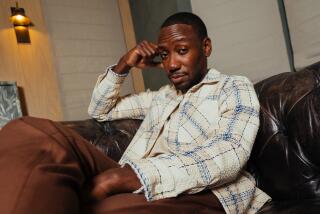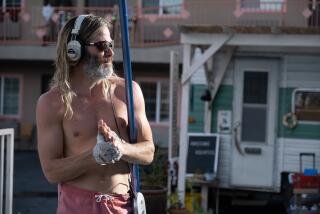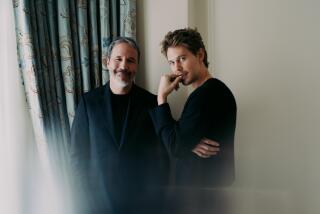Chris Pine: This is your captain speaking
- Share via
Chris Pine is splayed across a red restaurant banquette as if it were the throne Hollywood is offering him as one of its newly anointed male hotties. To say Pine’s actual seating is not a throne would be an understatement. The star of Paramount Pictures’ summer hit film “Star Trek” is perched on tattered old furnishings that would look at home in an Edward Hopper painting. The ratty red banquette will be a focal point of action in the political drama “Farragut North,” when it opens at the Geffen Playhouse on Wednesday.
Pine, 28, costars with “ Sex and the City’s” Chris Noth as media massagers in the psychological drama inspired by Howard Dean’s 2004 campaign, which briefly claimed the energies of the playwright and recovering politico Beau Willimon. Pine plays Stephen, a wunderkind press secretary who prides himself on his ability to manipulate any situation.
At the moment, Stephen is trying to work his magic on an attractive young intern played by “ Juno’s” Olivia Thirlby, who was in the New York production’s original cast last fall. In a Geffen rehearsal room, under the watchful eye of director Doug Hughes (who also helmed the current Mark Taper Forum production of David Mamet’s “Oleanna”), Molly/Olivia has just entered to drop off an envelope for Stephen/Chris at a dingy restaurant in East Des Moines, Iowa, where he’s making calls. And now he’s trying to beguile her into sticking around for a drink.
The characters play a flirtatious game of verbal ping-pong, and then Pine suddenly mimes reeling in Thirlby as if she’s on the end of an invisible hook. Hughes is delighted. “Your silver-tongued eloquence claims another helpless victim,” he says.
Pine’s smile grows even broader. “It’s just another day, Doug,” he replies.
Pine may be self-mocking when he says that, but then that’s part of the charm that got him into this enviable position in the first place. Directors and writers who’ve worked with him quickly volunteer that he’s a great guy to have around, not an overgrown enfant terrible like so many other young lions of Hollywood who will go unnamed.
When “Star Trek” director J.J. Abrams cast him in the pivotal role of Capt. Kirk, the filmmaker was looking for “a relative unknown who had to behave as if he were an experienced movie star without any of the negatives of being a big movie star,” he said. “He had to treat the cast and crew in a way that would make the other actors feel safe and the crew feel appreciated. And he was impeccable.”
Add a wicked sense of humor and piercing blue eyes, and it’s easy to see how Pine has burst onto the scene as one of the action heroes of summer. What may be less obvious is why he took the dark and relatively low-profile stage role of Stephen, who personifies “Farragut North’s” catchphrase that it’s a play “about the lust for power and the costs one will endure to achieve it.” (Warner Bros. is developing the film version, with Leonardo DiCaprio attached to star and George Clooney to direct.)
“I was in a hotel room with my girlfriend at the time, and I had a bunch of scripts to read -- film and theater -- and I saved it for last because I’d heard it was really good, and I wanted to end my night on a good note, being excited,” Pine says of his early-spring decision to take the part during a lull in the “Star Trek” publicity grind. “I couldn’t put it down. The twist at the end completely threw me. I thought Beau’s sense of dialogue was so right on and so -- I don’t want to say real, because that’s dumb -- but real without being affected, and intelligent, but not so intelligent to make you feel like a dumbass. And I’m very interested in the world of politics, so it appealed to me on that end.”
As Pine discusses the play during a break in rehearsal at the Geffen, his mind and body seem to be in constant motion. He alternately scratches his side and reaches for the coffee table as he mulls over certain questions, waiting for the right answer to finish percolating. He’s casually dressed in a blue button-down shirt, black jeans and high-top sneakers and a new beard. The facial fuzz was inspired by Willimon’s hirsute college buddy and political mentor, Jay Carson, who worked for Hillary and Bill and, at only 26, served as Dean’s national spokesman in 2004.
Pine is trying on the beard to see if it helps him penetrate Stephen’s miserable je ne sais quoi. He acknowledges that he’s not quite there yet.
“I’m having a hard time not judging him,” he says. “But there’s a primal drive in him to win at all costs that I’m coming to understand. That need comes from all the damage that all of us carry in one form or another. It’s just his ability to screw other people over, it’s that Machiavellian politician in him. . . . Once I can pinpoint that, I’ll be able to take it, hopefully, to a different level. But it sure is a lot of fun.”
Not just guy candy
In fact, the dark Stephen is just as much a typical Chris Pine role as the stellar Kirk is. His brief career has already swept the spectrum of characters, from heroes to antiheroes.
And for the most part, the dividing line is the one that separates film and theater.
Pine’s first big-screen role was as an arm charm for Anne Hathaway in 2004’s “Princess Diaries 2,” a service he also provided Lindsay Lohan’s character in 2006 in “Just My Luck.” He quickly moved on to the young hero role in the 2008 film “ Bottle Shock,” in which, as with “Star Trek,” he played a hapless young man who tries to live up to his father’s legacy (a scion of the family business much like Pine himself, the son of “CHiPs” veteran Robert Pine and TV actress Gwynne Gilford, and a third-generation thespian from what he calls “a working-class Hollywood” family, presumably because they literally worked).
Yet one of Pine’s favorite film roles was not a lead but rather the “redneck neo-Nazi hit man” of 2006’s “Smokin’ Aces.” And while he was becoming better known for his good-guy film parts, he was earning critics’ notice in much darker roles onstage, such as the vicious Carter in Neil LaBute’s “Fat Pig” at the Geffen in 2007 and the amoral journalist of Ronan Noone’s 2006 one-man drama “The Atheist” in New York.
Of Pine’s work in “Fat Pig,” LaBute says: “He had what I felt would have worked for either of the male characters in that piece -- the good guy or the bad guy. He had a watchability. I think he isn’t looking at [his career situation] as, ‘I have this chance of being a star.’ He knows a good role is a good role, and if it’s a bad guy, they often get the best lines. It’s great to see him going off to do a piece of theater. He’s approaching it as, ‘What is the best material I have at the moment?’ ”
Willimon thinks the pattern of Pine’s acting credits reflects the opportunities available to a young guy with leading-man looks, and “it doesn’t have as much to do with Chris Pine as it does with the chasm between theater and film,” he says. “In general, film -- particularly Hollywood films -- tend to lean more toward the good hero who overcomes obstacles and comes out on top. Theater, largely because it doesn’t bear the same commercial burden that film does, has the luxury and the bravery to take on risks and support the other sort of heroes -- call it the antihero. Sometimes obstacles do not result in a happy ending -- or a more complex ending than triumph.”
In August, Pine moves on to his own happy ending when he starts filming 20th Century Fox’s “Unstoppable” with Denzel Washington. In the thriller directed by Tony Scott, he and Washington will play conductors trying to stop a runaway train carrying toxic chemicals. It’s probably reasonable to assume that there are a couple of hero roles in there somewhere.
Pine seems gobsmacked about the opportunity to work with the two-time Oscar winner, an experience he anticipates will be tantamount to earning an acting PhD. “I don’t ever want to be so precious to eschew those kinds of roles because I’m on some mission to be the artiste in Hollywood,” says Pine, who credits his family with keeping his feet on the ground. “But I think there’s a closeted Peter Lorre inside me that loves to play the fun, darker, weirder roles that hopefully I’ll get the chance to play as I move ahead in my career.”
More to Read
The biggest entertainment stories
Get our big stories about Hollywood, film, television, music, arts, culture and more right in your inbox as soon as they publish.
You may occasionally receive promotional content from the Los Angeles Times.










